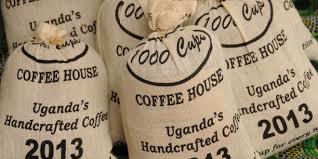UGANDA
Kahawa ni mazao ya nje ya kupokea nje ya Uganda. Mnamo 1989 uwezo wa uzalishaji wa kahawa wa Uuganda ulizidi kiwango cha mfuko wa milioni 2.3, lakini kiasi cha kuuza nje bado kilipungua kwa matatizo ya kiuchumi na usalama, na kiasi kikubwa cha kahawa bado kilikuwa kimetengwa kwa Uganda kutoka nchi za jirani.
Baadhi ya wakulima wa kahawa walikua miti ya kakao kwenye ardhi tayari huzalisha kahawa ya robusta. Uzalishaji wa kakao ulipungua katika miaka ya 1970 na 1980, hata hivyo, na hali za soko zimevunja moyo wawekezaji wa kimataifa kutoka kwa kuzingatia kama uwezekano wa kukabiliana na Uganda kwa kutegemea mauzo ya kahawa. Coca iliyozalishwa ndani ya nchi ilikuwa ya ubora wa juu, hata hivyo, na serikali iliendelea kutafuta njia za kurekebisha sekta hiyo. Uzalishaji ulibaki chini wakati wa miaka ya 1980, kuongezeka kutoka tani 1,000 mwaka 1986 hadi tani 5,000 tu mwaka 1989. Mamlaka ya Maendeleo ya Kahawa ya Uganda ilianzishwa mwaka 1991 na amri ya serikali, kulingana na uhuru wa sekta ya kahawa.
Kahawa ya Robusta inakua natively katika eneo la misitu ya Kampala. Kuanzia mwaka wa 1999 hadi 2002 jitihada zilifanywa kwa biashara ya kahawa kama bidhaa ya watumiaji wa kwanza, kuhamasisha na kupanua mafanikio ya kivuli kilichopandwa katika Amerika ya Kati. Mapato kutoka kwa uzalishaji wa kahawa yalikuwa na lengo la fedha za shughuli za uhifadhi wa uhifadhi.
Kahawa ya Arabia inakua karibu na mteremko wa Mlima Elgon. Kahawa ililetwa Uganda kutoka Ethiopia na asili ya mteremko wa Mlima Elgon.
Lugha za Uganda
Uganda ni nchi mbalimbali. Lugha arobaini tatu kati yake huwa katika familia nne kuu-Bantu, Nilotic na Kati ya Kusini-na lugha nyingine mbili katika familia ya Kuliak. Kati ya hizi, 41 ni wa asili na 2 sio wa asili. Zaidi ya hayo, 5 ni taasisi, 27 zinaendelea, 7 zina nguvu, 2 zina shida, na 2 wanakufa.
Kiingereza, inayotokana na kipindi cha kikoloni, ni lugha rasmi. Kuna pia lugha ya ishara ya Uganda. Kama ilivyo katika nchi nyingi za Afrika, Kiingereza, lugha ya nguvu za ukoloni, ilianzishwa katika serikali na maisha ya umma kwa njia ya kazi ya kimisionari na mfumo wa elimu. Katika miongo ya kwanza ya karne ya ishirini, Kiswahili ilipata ushawishi kama haikuwa tu kutumika katika jeshi na polisi, lakini pia ilifundishwa katika shule. Ganda iliona kuanzishwa kwa Kiswahili kuwa tishio kwa nguvu zao za kisiasa na kwa sehemu kupitia ushawishi wao; Kiingereza iliendelea kuwa lugha pekee ya lugha wakati huo.
Lugha za asili za watu wa Uganda zimesababisha Kiingereza wa Uganda.

UGANDA
Coffee is Uganda's top-earning export crop. In 1989 Uganda's coffee production capacity exceeded its quota of 2.3 million bags, but export volumes were still diminished by economic and security problems, and large amounts of coffee were still being smuggled out of Uganda for sale in neighbouring countries.
Some coffee farmers cultivated cocoa trees on land already producing robusta coffee. Cocoa production declined in the 1970s and 1980s, however, and market conditions discouraged international investors from viewing it as a potential counterweight to Uganda's reliance on coffee exports. Locally produced cocoa was of high quality, however, and the government continued to seek ways to rehabilitate the industry. Production remained low during the late 1980s, rising from 1,000 tons in 1986 to only 5,000 tons in 1989. The Uganda Coffee Development Authority was formed in 1991 by government decree, in line with the liberalization of the coffee industry.
Robusta coffee grows natively in the Kampala forest area. From 1999 to 2002 an effort was made to commercialize this coffee as a premium consumer brand, emulating and extending the success of shade grown in Central America. Revenue from the coffee production was intended to finance conservation management activities.
Arabica coffee grows around the slopes of Mount Elgon.The coffee was introduced to Uganda from Ethiopia and naturalised along the slopes of Mount Elgon.
Languages of Uganda
Uganda is a multilingual country. Forty three of its living languages fall into four main families—Bantu, Nilotic and Central Sudanic—with another two languages in the Kuliak family. Of these, 41 are indigenous and 2 are non-indigenous. Furthermore, 5 are institutional, 27 are developing, 7 are vigorous, 2 are in trouble, and 2 are dying.
English, inherited from the colonial period, is the official language. There is also a Ugandan Sign Language. As in many African countries, English, the language of the colonising power, was introduced in government and public life by way of missionary work and the educational system. During the first decades of the twentieth century, Swahili gained influence as it was not only used in the army and the police, but was also taught in schools. The Ganda viewed the introduction of Swahili as a threat to their political power and partly through their influence; English remained the only official language at that time.
The native languages of the Ugandan people have influenced Ugandan English.
Come and join us for a cup of coffee (on special at R10 until 8am) or just for a chat.
You don't need to spend anything, but if you do, it will be for your own account.

Date: Friday, 19 July 2019
Time: From 06h45 to 07h45
Place: Brioche, 181 Main Rd, Walmer
We look forward to seeing you there!
Logging in Swahili would be great.